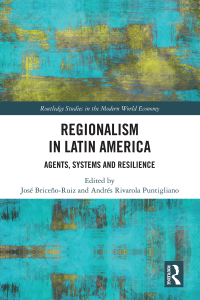Buy Regionalism in Latin America: Agents, Systems and Resilience 1st Edition PDF ebook by author J. BriceñoRuiz; Andrés Rivarola – published by Routledge in 2021 and save up to 80% compared to the print version of this textbook. With PDF version of this textbook, not only save you money, you can also highlight, add text, underline add post-it notes, bookmarks to pages, instantly search for the major terms or chapter titles, etc.
You can search our site for other versions of the Regionalism in Latin America: Agents, Systems and Resilience 1st Edition PDF ebook. You can also search for others PDF ebooks from publisher Routledge, as well as from your favorite authors. We have thousands of online textbooks and course materials (mostly in PDF) that you can download immediately after purchase.
Note: e-textBooks do not come with access codes, CDs/DVDs, workbooks, and other supplemental items.
eBook Details:
Full title: Regionalism in Latin America: Agents, Systems and Resilience 1st Edition
Edition: 1st
Copyright year: 2021
Publisher: Routledge
Author: J. BriceñoRuiz; Andrés Rivarola
ISBN: 9780367376802
Format: PDF
Description of Regionalism in Latin America: Agents, Systems and Resilience 1st Edition:
This interdisciplinary edited volume explores the political economy of regionalism in Latin America. It identifies convergent forces which have existed in the region since its very conception and analyses these dynamics in their different historical, geographic and structural contexts. Particular attention is paid to key countries such as Argentina, Brazil and Mexico, as well as subregions like the Southern Cone and Central America. To understand the resilience of regionalism in Latin America, this book proposes to highlight four main issues. Firstly, that resilience is linked to mechanisms of self-enforcement that are part of the accumulation of experiences, institution building and common cultural features described in this book as regionalist acquis. Secondly, the elements and driving forces behind the promotion and expression of the regionalist acquis are influenced and shaped by nested systems in which social processes are inserted. Thirdly, when looking at systems, there is a particular influence by national and global ones, which condition the form and endurance of regional projects. Finally, beyond systems, the book highlights the relevance of agents as crucial players in the shaping of the resilience of regionalism in Latin America. This insightful collection will appeal to advanced students and researchers in international economics, international relations, international political economy, economic history and Latin American studies.





